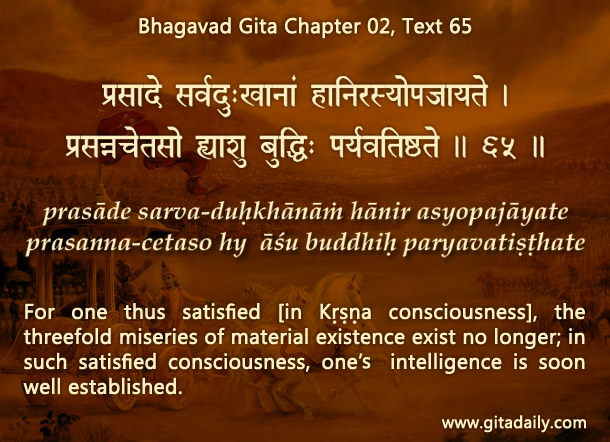Wisdom means knowing the difference between virtue and vice; and cultivating virtue and curbing vice. We get wisdom by the study of scriptures and the mercy of the masters. By wisdom, we intellectually understand and experientially perceive how vice is deceptive – it promises pleasure, but delivers trouble. So, we reject vice and expect it to go away. But to our dismay, vice maintains a tenacious hold on us – a hold that wisdom doesn’t seem to loosen. Vice departs only when we become devotionally purified and stop feeling any attraction towards vice’s promises of pleasure. The Bhagavad-gita (02.60) depicts our predicament: even though we strive for self-mastery, still we become overpowered by the senses. The senses, of course, are the residing places of vice. Acting through them, vice distorts our perception, making its fleeting pleasure seem irresistible.
Vice maintains a tenacious hold on us – a hold that wisdom doesn’t seem to loosen.
The next verse (02.61) shows the way out of our predicament: positive devotional engagement centered on fixing our consciousness on Krishna. When we become devotionally focused, the resulting connection with the all-attractive reservoir of all pleasure provides a higher happiness that makes saying no to vice easier. Such diligence in positive devotional service and vigilance in avoiding negative sensual indulgence progressively leads to purification. The Gita (02.64) summarizes this process and announces its fruit: prasada, mercy in the form of purity. When we thus attain purity, the next verse (02.65) declares that misery, especially the misery of constantly battling with vice, ends – and we relish the sublime joy of undistracted absorption in Krishna. At this stage, the intelligence becomes fully stabilized, being not just detached from vice but also attached to Krishna, the supreme embodiment of all virtue. As wisdom thus matures into pure devotion, we eventually graduate to life eternal with Krishna.
Explanation of article:


Leave A Comment